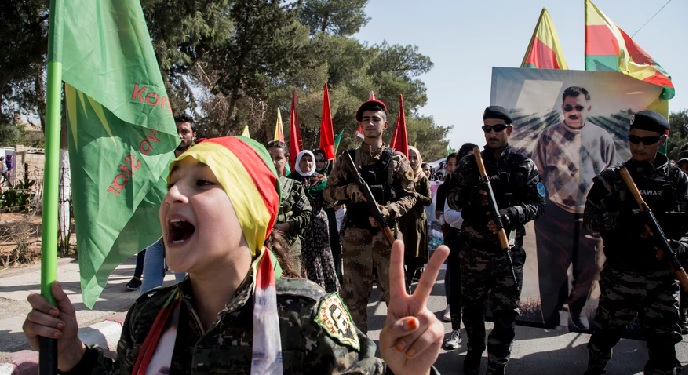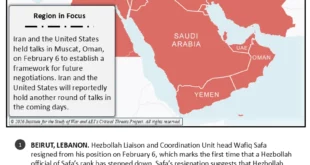
Looming U.S. legislation that imposes stringent sanctions on the Syrian government has raised concerns among the U.S.-backed Syrian Democratic Forces (SDF), with Kurdish officials warning that including northeast Syria region in the sanctions could hinder their fight against the Islamic State (IS) terror group.
The Caesar Syria Civilian Protection Act, which takes effect June 17, sanctions the Syrian government over human rights abuses and targets companies working with the regime and its military, construction, energy and engineering sectors. Syrian President Bashar al-Assad has called it “economic terrorism.”
Sinam Mohamad, the SDF representative in the U.S., told VOA that authorities in northeast Syria fear the sanctions could impact their economy, deepening the impoverishment of civilians already struggling to recover from IS destruction.
“As Caesar sanctions are about to go into effect, the status of northeastern Syria must be taken into consideration especially when these sanctions might affect the battle to fight IS,” Mohamad told VOA.
Mohamad said SDF was unsure if the region, known by locals as the Autonomous Administration of North and East Syria, will be protected from the consequences of the crippling sanctions, especially as it uses the Syrian currency, Lira.
She said Kurdish officials hope Washington in its sanctions act makes it clear that their area will remain open to commercial transactions with other countries and international organizations providing aid to rebuild infrastructure in their region.
The SDF has been assured by the U.S. deputy special envoy to the anti-IS global coalition William Roebuck, according to Mohamad. The assurance, Mohamad added, was “a positive stand. But it’s still unclear what are the procedures that will be put in place to exclude this region from the sanctions.”
US stance
A U.S. State Department spokesperson told VOA that the sanctions seek to prevent the Syrian regime from “abusing the international financial system and global supply chain to continue brutalizing the Syrian people.”
The official said the U.S. will provide exemptions for humanitarian aid to ensure civilians are not harmed by the sanctions.
“As the sanctions under the Caesar Act enter into force, the United States will remain in close coordination with our partners, the humanitarian community, and civil society groups, and we will continue our support to help meet humanitarian needs and create the kind of stability and security necessary for a better future for the Syrian people,” the spokesperson told VOA.
The Caesar Act passed the U.S. Senate later last year in a bipartisan effort and as a part of the National Defense Authorization Act of 2020. It is named after a pseudonym used by a Syrian military police forensic photographer based in Damascus. The photographer defected from the Syrian regime in 2013 and smuggled out of Syria about 55,000 photographs documenting systematic torture of prisoners between 2011 and 2013 by the Syrian regime security inside detention facilities.
Kurdish officials in a May statement warned that the sanctions, if applied to the northeastern region, could negatively impact their efforts to go after IS remnants and maintain security and stability.
“IS danger could return to Syria and the world, and measures must be taken to support the effort to fight IS in our areas,” the statement read. “We will make all necessary efforts to mitigate the effect of the sanctions on our areas as we will work to limit its negative consequences,” the statement said.
Deteriorating economy
Some Syria experts say the approaching U.S. sanctions have already worsened Syria’s fragile economy with the Syrian currency hitting an all-time low, standing Sunday at $0.002 USD. Prices have been rising as Syrians across the country took to the streets recently to protest deteriorating living conditions.
To face the possible consequences on the northeast, Kurdish authorities have called on farmers in the region to sell their crops to the local administration and banned exporting it to the areas under the Syrian government.
However, some experts charge that Caesar Act’s overall effect on the local economy will be limited. The sanctions, they say, will deal a blow to the al-Assad’s regime for its alleged war crimes as well as its main backers Russia and Iran. Similarly, the act could discourage countries such United Arab Emirates, Lebanon and China to reestablish relations with the Syrian government.
“Caesar Act is quite targeted in terms of its secondary sanctions, that is specific to the companies contributing to the construction efforts to petroleum and to aircrafts and other things to do with to the military, so it shouldn’t have quite a negative effect on the people as a whole,” Genevieve Zingg, a legal fellow at the Syria Justice and Accountability Center (SJAC), told VOA.
Zingg said that the U.S. humanitarian exemptions ensure Syria will have free access to medical and humanitarian supplies, especially as the war-torn country remains vulnerable to a coronavirus outbreak.
The sanctions, she said, will not achieve justice for crimes committed during the Syrian war. However, “they are very important as a deterrent mechanism to ensure that we are not normalizing relations with a regime and its allies that perpetrated horrible war crimes and violations of international law throughout this conflict.”
Since the beginning of the Syrian civil war in 2011, hundreds of thousands of people have been killed and millions have been displaced. The Syrian Observatory for Human Rights says it has documented during the war more than 16,000 deaths from torture, including some 125 children.
 Eurasia Press & News
Eurasia Press & News


